- Home
- Jim Kjelgaard
The Spell of the White Sturgeon
The Spell of the White Sturgeon Read online
Produced by Greg Weeks, Mary Meehan and the OnlineDistributed Proofreading Canada Team athttps://www.pgdpcanada.net
_THE SPELL OF THE WHITE STURGEON_
JIM KJELGAARD
DODD, MEAD & COMPANY NEW YORK 1953
Copyright, 1953
By Jim Kjelgaard
All Rights Reserved
No part of this book may be reproduced in any form without permission in writing from the publisher
_Library of Congress Catalog Card Number: 53-6314_
Printed in the United States of America by Vail-Ballou Press, Inc., Binghamton, N. Y.
TO David LeClair and Richard Smith
_CONTENTS_
_Chapter One_ Storm 1
_Two_ Wreck 16
_Three_ On the Beach 34
_Four_ Trouble for the _Spray_ 54
_Five_ Rescue 73
_Six_ New Venture 89
_Seven_ Partners 109
_Eight_ Action 125
_Nine_ Pirates 144
_Ten_ The Great Fish 160
_Eleven_ Fisherman's Luck 171
_Twelve_ The Pond 184
The characters and situations in this book are wholly fictional andimaginative: they do not portray and are not intended to portray anyactual persons or parties.
_THE SPELL OF THE WHITE STURGEON_
CHAPTER ONE
_STORM_
Ramsay Cartou leaned on the rail of the ponderous side-wheeler, the _H.H. Holter_, and watched without interest while a horse-drawn truckbrought another load of cattle hides on board. The sweating stevedoreswho were loading the _Holter_ and the belaboring mate who supervisedthem began stowing the hides into the hold. The _Holter's_ winch, eitherruined by an inexpert operator or about to fall apart anyhow, wasbroken. All the work had to be done by hand.
Ramsay turned to breathe the clean air that swept in from Lake Michigan.It was impossible, anywhere on the _Holter_, to get away from the smellof the hides, but at least he did not have to look at them.
Not since he had left the brawling young city of Chicago two daysbefore, to make his way north to the equally lusty young city ofMilwaukee, had the sun shone. In those two days, while he waited forrepairs to the engine hauling the train in which he was riding, he hadseen nothing of the lake. Now, from the mouth of the river where the_Holter_ was anchored, he had a clear view, and it was exciting.
The grays of the sky and the grays of the lake were indefinable, with noclear separation. Ramsay shivered slightly.
The lake was a cat, he thought, a great sinewy cat, and the whitecapsrolling into the harbor were its sheathed and unsheathed claws. It wasan awesome thing, but at the same time a wonderful one. A tremblingexcitement rose within him. The lake was at once a challenge and apromise--a threat and a mighty lure. He stared, fascinated, and tried totrace the rolling course of the waves as they surged toward the bank. Itwas impossible to follow just one for, as soon as it swelled, itretreated, to lose itself in the immense lake and renew itself inendless forward surges. Like recklessly charging soldiers, the wavescast themselves up on the bank and, exhausted, fell back.
So absorbed was he in the spectacle and so fascinated by the lake, thatfor a moment he was unaware of the man beside him or of the words hespoke. Then a rough hand grasped his shoulder and, reacting instantly,Ramsay whirled around.
"Why ain't you at work with the rest, boy?"
"Take your hand off me!"
The man who stood beside him was oddly like a rock, a great graniteboulder. Two inches taller than Ramsay's six feet, he had a barrel chestand long, powerful arms. A leather jacket, with the sleeves cut off,hung loosely on his upper body, and beneath it he wore a homespun shirt.His black trousers had been fashioned by an exacting tailor but sadlymisused. They were torn and patched with anything that might have beenat hand. Black hair straggled from beneath his crushed black hat and thehair needed cutting. His eyes, colorless, were oddly inanimate, like twoglass balls with no special warmth or feeling. A black beard sproutedfrom his cheeks and half-hid his face, but the beard did not hide thick,coarse lips. He repeated, "Them hides got to be loaded! Get to work!"
"Load them yourself!"
"I'll give you a lesson you won't forget, boy!"
"Do that!" Ramsay tensed, awaiting the anticipated attack of the bigger,heavier man. He felt almost a grim pleasure. He had learned his fightingthe hard way, as anybody brought up on the New York water-front, andwith an irresponsible father had to learn it. The man who faced him washeavier by a good sixty pounds, but he was a bull of a man and,probably, he would fight like a bull. Would he know about matadors?
The man's eyes were narrowed to pinpoints, and they seemed to spark.Sheer rage made his face livid, while his lips were distorted in asnarl. He drew back, readying himself for the spring that wouldoverwhelm this brash youth who had dared dispute him. Ramsay poised onlithe feet, prepared to side-step.
Then fat, fussy little Captain Schultz, skipper of the _Holter_, steppedbetween them. He wheezed like an over-fat lap-dog, "Vot you doin'?"
"I want them hides loaded and the ship under way!" the man who facedRamsay snarled.
"Ach! Dis man payin' passenger!"
A deck hand, his eyes downcast, hurried past. The man who had orderedRamsay to get to work stood still for a moment, glaring. Then,furiously, soundlessly, he turned on his heel and strode up thegangplank to the pier. Ramsay watched him go, and he knew that, even ifthere had not been unpleasantness between them, he could never like thisman. No matter where they met, or how, they would never get alongtogether.
Captain Schultz also turned to watch the man depart. Then he gave hisattention to Ramsay.
"Ach! You should be careful 'pout startin' fights, poy."
"So should other people!" Ramsay said, still smarting.
"You should, too. Yaah!"
And, as though he had settled that once and for all, Captain Schultzwaddled away to speak to the mate who was supervising the stevedores. Alittle uncertainty arose in Ramsay.
This--this half-wilderness, half-civilization in which he found himselfwas a land of strong contradictions. Lake Michigan, with all its fearand all its terror, and all its inspiration, lapped the Wisconsinshores. Yet some man could be so little impressed by the vast lake thathe could name a boat for himself. Possibly a man capable of building orowning a ship like the _Holter_ had a right to think of himself.
Ramsay turned again to look at the lake, and his mind projected him faraway from the worn, slippery decks of the _Holter_. Almost he wasunaware of the two silver dollars in his pocket, all the money he hadleft in the world, and of the uncertain future. At the same time, whilehis inmost being feasted on the lake, a part of his mind reviewed theevents that had brought him here. He had an abrupt, uncomfortablerevival of a New York memory.
There was a lion, a great, black-maned lion, in the New York zoo. It waswell fed and well cared for, its every need attended. But most times thelion had still seemed restless and unhappy, and sometimes it had been atired thing. Then it was hardly a lion at all but just a weary, livingthing. Ramsay had wondered often how that lion felt.
He had never decided exactly how it did feel; within himself there werea dozen conflicting opinions. The lion paced its cage, and coming to theend of the very narr
ow limits granted to it, it turned and went back theother way. Coming to the end of the cage, it turned again. But all itever found was the place it had already left. Once in a great while thelion had been very alert and very attentive. It was as though, now andagain, the great animal could scent a wind of which nothing else wasaware. That wind brought him memories of freedom, and happiness and theunhampered jungle life that had been.
Ramsay had gone often to see the lion, and though he never understoodwhy, he always felt as though he had something in common with it, and heunderstood it partially. New York offered an abundance of opportunities,but they were well bound and well defined. There had always been a wildlonging, a reckless yearning, within him, and often he thought that thenewspapers which carried stories of the undeveloped Midwest were to himwhat the faint jungle scents had been to the lion. He had devoured everystory eagerly. The Midwest was new, the papers had said. Good farm land,if one wanted to be a farmer, could be had for as little as four dollarsan acre. It was the land of the future.
Again Ramsay jingled the two dollars in his pocket. He had answered thecall of the Midwest because he could not help answering it. He had totry and to go and see for himself, but at the same time a caution,inborn in his Scotch mother and transplanted to him, could not beignored. Before he burned his bridges behind him he had wanted to makesure that there were some ahead, and correspondence with the manager ofthe Three Points tannery had led to the offer of a job when he came. Adollar and twenty-five cents a day the tannery was offering able-bodiedmen, and there were too few men.
Ramsay looked out upon the lake, and a little thrill of excitement sweptthrough him. Sometimes he had felt doubts about the wisdom of havingleft New York for the Midwest. He had been sure of a place to sleep andenough to eat as long as he stayed in New York, and again he felt thetwo dollars in his pocket.
Troubled, he looked out on the surging lake, and knew an instant peace.It was worth seeing. It was something few New Yorkers ever saw. Theocean was at their doorstep, and few of them even bothered looking atthat; but the ocean was not like this. Lake Michigan was fresh andclean, different, wild and, as the papers had promised, new. Ramsaytasted the wet air, liking it as he did so.
He turned at a sudden squealing and clatter on the pier, and saw fourmen trying to fight a little black horse onto the ship. The horse, nottrusting this strange craft and certainly not liking it, lashed out withstriking hooves. Dodging, the men finally fought it into a sort ofsmall cage they had prepared. The horse thrust its head over the sideand bugled shrilly.
Ramsay watched interestedly, distracted for the few minutes the menneeded to get the horse into its cage. It reared as though it wouldclimb over the confining bars, then stood quietly. A sensible horse,Ramsay decided, and a good one. Only fools, whether they were animals ormen, fought when there was no chance of winning or battered their brainsout against a stone wall. Good animals and good men never consideredanything hopeless, but they tried to fight with intelligence as well asbrawn. Ramsay glanced again at the horse.
It was standing quietly but not resignedly. Its head was up. Its earswere alert and its eyes bright. It still did not like the ship, but ithad not just given in. Rather, it was waiting a good chance to get away.Ramsay grinned. The next time, he decided, they would have a little moretrouble getting that horse onto anything that floated. Then he returnedhis attention to the loading of the _Holter_.
A continuous line of horse-drawn trucks loaded with hides was comingalongside the ship, and the stevedores were laboring mightily to stowthe hides away. Obviously whoever owned the _Holter_ intended to loadher with every last pound she would carry. He wanted a paying cargo thatwould pay off to the last cent. Almost imperceptibly the ship settledinto the water. The gangplank, that had been almost even with the deck,now tilted downward.
Once or twice Ramsay saw the bearded, jacketed man with whom he hadquarreled. But the man did not venture onto the _Holter_ again. Rather,he seemed more interested in getting the hides loaded. Ramsay speculatedon the scene he was witnessing, and then he found the whys andwherefores, the reasons behind it.
This Wisconsin country was still more than half a wilderness. It had itsfull share of wilderness men, but its fertile farm lands were attractingmany Dutch, Swiss and German farmers. Struggling with a half-tamedcountry, they did anything they could to earn a livelihood, and some ofthem raised beef cattle. The hides were a by-product and the worldmarkets needed leather. But the leather could not be processed withoutnecessary materials, and the hemlock trees which provided tan bark werebeing cut at Three Points. It was cheaper, and easier, to transport thehides to Three Points than it was to carry the cumbersome tan bark toMilwaukee or Chicago. From Three Points, harness leather, sole leatherand almost every other kind, was shipped by boat to Chicago and fromthere it was carried to the eastern markets by rail.
* * * * *
It was not until mid-afternoon that the last of the hides were loadedand the hatches battened down. The side wheel began to turn and the_Holter_ moved cumbersomely down the river into Lake Michigan. Standingin his enclosure, the little horse stamped restlessly and neighed again.He was nervous, but he was not afraid.
Ramsay approved. The little black horse didn't like his cage, but hewould meet the situation as it existed rather than lose his head orbecome panic-stricken. Ramsay walked over to the cage and the horsethrust his velvet muzzle against the bars. When the boy rubbed his nose,the horse twitched his ears and looked at him with friendly eyes.
Thick smoke belched from the _Holter's_ stack and made a long plume overthe lake, behind the plodding side-wheeler. A strong wind was screamingin from the north and lashing the water angrily into leaping waves. Theship nosed into the trough created by the waves and rose again on theopposite side. Ramsay walked to the bow and leaned over the rail, and amighty excitement rose anew within him.
This, it seemed, was what he had wanted to find when he left New York togo roving. The lake, storm-lashed, was a wild and terrible thing. It wasa beast, but something with a vast appeal lay behind its fury and itsanger. Lake Michigan was the place for a man. It would never be free ofchallenge if there was anyone who dared to pick up the gauntlet it cast.
There was motion beside Ramsay, and the deck hand who had passed whilehe argued with the bearded man fell in beside him. He glanced at theman. The deck hand was about thirty-six, older than Ramsay by eighteenyears, and there was a seasoned, weather-beaten look about him. It wasas though he had turned his face to many a raging storm and many afierce wind.
He grinned amiably. "Hi!"
"Hi!" Ramsay said.
The deck hand chuckled. "Boy, I thought you were in trouble sure whenyou were ruckusin' with old Devil Chad."
"Devil Chad?"
"Yeah. The one who told you to help load hides. He'd of cleaned the deckwith you."
"Maybe he would," Ramsay said. "And then again, maybe he wouldn't."
"He would," the deck hand asserted. "He can lick anybody or anything.Owns half the country 'round here, he does, includin' most of the_Holter_. What's more, he aims to keep it. One of the richest men inWisconsin."
"Quite a man," Ramsay said drily.
"Yeah, an' quite a fighter. On'y reason he didn't clean your clock wason account Captain Schultz told him you was a payin' passenger. DevilChad, he gets half the fare every passenger on the _Holter_ pays, hedoes."
Ramsay knew a rising irritation. "What makes you so sure he can't be cutdown to size?"
"Never has been, never will be," the deck hand asserted. He regarded thesurging lake morosely, and then said, "One of these days this old tub isgoin' to end up right at the bottom of Michigan, it is. Either that oron the beach. Wish I was some'res else."
"Why don't you go somewhere else?"
"One of these days I will," the deck hand threatened. "I'll just hauloff an' go back to the ocean boats, I will. I was on 'em for fourteenyears, an' quit to come here on account I got scar't of storms at sea.Ha! Worstest thing
I ever see on the Atlantic ain't nothin' to what thislake can throw at you."
"Is it really that bad?" Ramsay asked eagerly.
"Bad?" the deck hand said. "Boy, I've seen waves here taller'n a ship.In course nobody ever goes out when it's that bad on account, if theydid, nobody'd ever get back." He scanned the horizon. "We're goin' tohit weather afore we ever gets to Three Points. Goin' to hit it sure.Wish this old tub wasn't loaded so heavy, an' with hides at that."
A wave struck the bow, crested and broke in foaming spray that castitself up and over the ship. Ramsay felt it, cool on his face, and helicked eager lips. Lake Michigan was fresh water, not salt like theocean, and it was as pure as an ice-cold artesian well. It was also, hethought, almost as cold.
He looked into the clouded horizon, studying the storm that battered the_Holter_. He smiled to himself.
Suddenly he became all eager interest, peering out into the drivingwaves and focusing his attention on one place. He thought he had seensomething there, but because of the angry lake he could not be sure. Itmight have been just a drifting shadow, or just one more of the darkwaves which seemed to fill the lake and to be of all shades. Then, andplainly, he saw it again.
It was a boat, a little boat no more than twenty-four feet from bowspritto stern, and it was carrying almost a full load of sail as it tackedback and forth into the wind. Ramsay had not seen the sails because,when he first spotted the boat, it had been heeled over so far that thesails did not show. Now they were showing and full, and the little boatsailed like a proud swan with its wings spread.
Ramsay forgot the _Holter_, the man beside him and everything else savethe little boat. The _Holter_ and nothing on it, with the possibleexception of the little black horse, was even remotely interesting. Butthis was. Ramsay breathed a sigh of relief.
He should have known. He should have understood from the first that,when any water was as mighty and as exciting as Lake Michigan, therewould be some to meet its challenge with daring, grace and spirit. Thetiny craft was a mere cockleshell of a boat, a ridiculously small thingwith which to venture upon such a water, but Ramsay could not helpfeeling that it would be much better to sail on the little boat than onthe _Holter_.
He kept fascinated eyes on it as it tacked back into the wind. Again itheeled over, so far that it was almost hidden in the trough of a vastwave. Saucily, jauntily it bobbed up again.
The _Holter_, that workhorse of the water, plodded stolidly on itsappointed way. Ramsay continued to watch the little boat, and now theywere near enough so that he could see its crew of four. He gaspedinvoluntarily.
Working into the wind, the little boat was coming back, and its coursetook it directly across the _Holter's_ right of way. Ramsay clenched hisfingers and bit his lip fiercely. A collision seemed inevitable.Wide-eyed, he watched the little boat.
Now he saw its name, not painted on with stencils but written in a fine,free-flowing script, _Spray_, and the carved Valkyrie maiden that wasits figurehead. A big gull, obviously its tame one, sat on the very topof the mast and flapped its wings. The _Spray_ had a crew of four, butRamsay concentrated on just one of them.
He was huge, fully as tall as the black beard who had accosted Ramsayand just as heavy, but he was a different kind of man. He balanced onhis little boat's swaying deck with all the grace of a dancer, while heclung almost carelessly to a line that ran through a pulley.
No inch of the man's shirt and trousers, which were all the clothing hewore, for he was bare-footed, remained dry, and the shaggy blond curlsthat carpeted his head were dripping. White teeth gleamed as he lookedup at the _Holter_ and laughed. Ramsay leaned forward excitedly. Hewarmed to this man, even as he had been repelled by the black beard thedeck hand called Devil Chad. The man on the boat was gay and spirited,and he seemed complete master of everything about him.
The deck hand put cupped hands to his mouth and screamed, "Sheer off!Sheer off!"
Captain Schultz's voice was heard. "_Dumkopf!_ Go 'way!"
Then, just as it seemed that collision could not be avoided, more sailbloomed on the _Spray's_ mast and she danced lightly out of the way. Theman with the shaggy curls looked back and waved a taunting hand. Ramsayturned to watch, but the _Spray_ disappeared in a curtain of mist thathad draped itself between the _Holter_ and the shore. His eyes shining,the boy turned to the deck hand.
"Who was that?"
"A crazy Dutch fisherman, named Hans Van Doorst," the deck hand growled."He'd sail that peanut shell right in to see Old Nick hisself, an' oneof these days he will. He ain't even afraid of the White Sturgeon."
"What's the White Sturgeon?"
The deck hand looked at him queerly. "How long you been here, boy?"
"A couple of days."
"Well, that accounts for it. You see the White Sturgeon; you startprayin' right after. You'll need to. Nobody except that crazy Van Doorsthas ever saw him an' lived to tell about it. Well, got to get to work."
The deck hand wandered away. Ramsay turned again to face the storm andlet spray blow into his face. He thought of all that had happened sincehe had, at last, reached Lake Michigan. This Wisconsin country wasindeed a land of sharp contrasts.
The _Holter_ and the _Spray_. Captain Schultz and the deck hand. DevilChad and Hans Van Doorst. A tannery and a fisherman. Local superstitionabout a white sturgeon. Ramsay knew a rising satisfaction. Thissemi-wilderness, lapped by a vast inland sea, might be a strange land,but nobody could say that it was not an interesting or a strong one. Hislast lingering doubts were set at rest and for the first time he wasentirely satisfied because he had come. A strong country was always theplace for strong people.
Ramsay raised his head, puzzled by something which, suddenly, seemed tobe out of place. For a second he did not know what it was. Then herealized that the crying gulls which had been following the _Holter_ inthe hope that scraps or garbage would be tossed to them or elseinterested in whatever debris the side wheel might churn up, were nolonger there.
Ramsay knew a second's uneasiness, and he could not explain it. He didnot know why he missed the gulls. It was just that they and their cryinghad seemed a part of the lake. Now that they were gone, the lake wasincomplete. The boy braced himself against a sudden, vicious burst ofwind.
Even a land-lubber could tell that the storm's fury was increasing. Asharp patter of rain sliced like a shower of cold knives across the_Holter's_ deck, and Ramsay ducked his head. He raised it again,grinning sheepishly as he did so, then gripped the rail to steadyhimself. He watched with much interest as the storm raged even morestrongly.
It was driving directly out of the northwest, and it seemed to beperpetually re-born in the dark clouds that had possession of the sky. Ahowling wind accompanied it, and more shrapnel-bursts of rain.
The waves rose to prodigious heights. Dipping into them, the _Holter_seemed no more than a leaf on this tossing sea. Turning, Ramsay saw thehelmsman clinging almost fiercely to his wheel, as though he wouldsomehow soften the storm's rage by doing that. In his cage the littleblack horse nickered uncertainly.
Then there came something that was instantly apparent, even above thescreaming wind. The rough rhythm of the _Holter's_ throbbing enginesseemed to halt. The ship shivered mightily, as though in pain.
The engines stopped.

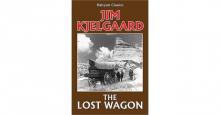 The Lost Wagon
The Lost Wagon The Spell of the White Sturgeon
The Spell of the White Sturgeon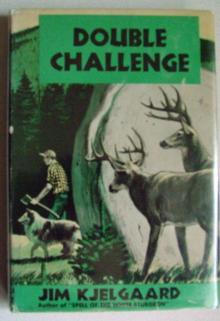 Double Challenge
Double Challenge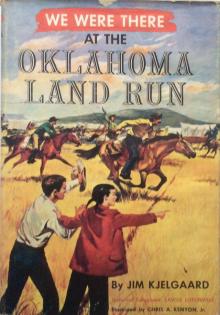 We Were There at the Oklahoma Land Run
We Were There at the Oklahoma Land Run Two Dogs and a Horse
Two Dogs and a Horse The Duck-footed Hound
The Duck-footed Hound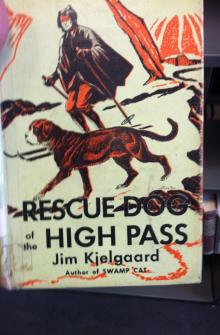 Rescue Dog of the High Pass
Rescue Dog of the High Pass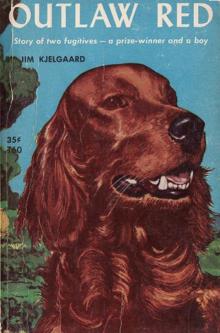 Outlaw Red
Outlaw Red Big Red
Big Red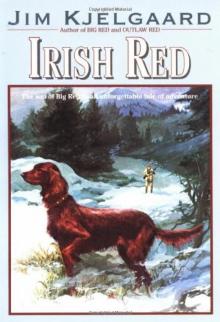 Irish Red
Irish Red